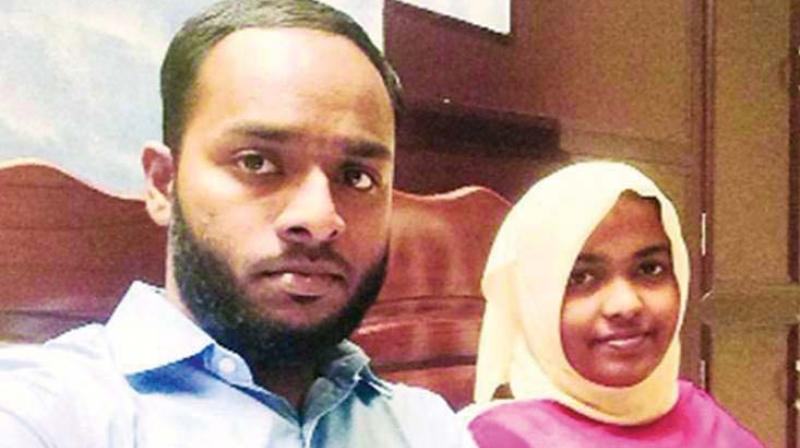Forced conversion exists, we need law to prevent it
Supreme Court ordered an NIA probe into the conversion and marriage of Akhila Ashokan.

August 16, the Supreme Court ordered an NIA probe into the conversion and marriage of Akhila Ashokan, a 24-year-old woman from Kerala. In December 2016, Ashokan married 27-year-old Shefin Jehan, before which her conversion was facilitated by Therbiyat Islam Sabha, a mosque in Calicut. This has brought the issue of forced conversion, to which mainstream media has awarded the incendiary phrase, 'love jihad', rushing back into the spotlight. At the outset, it must be said that 'Love Jihad' is a term I don't particularly care for, 'jihad' bringing with it several other ramifications. 'Forced conversion' is a more Constitutional phrase, one that the Supreme Court has now accepted.
The Akhila Ashokan case has caused an uproar resulting in protests across Kerala with Hindu and Muslim hardliners barging out of the fringes onto the frontlines of political discourse. The incident, however, is shrouded in shades of grey, the issue of religion raised in a certain context: are young people being forced and indoctrinated in a particular way? What is being propagated by mainstream media as undue societal intervention in personal choice presents, in truth, a far darker picture: Illegal, religious coercion with undercurrents of organisational backing. The SC-sanctioned NIA probe into the Ashokan case implies that our reservations are not entirely unfounded.
Earlier this week, I paid Akhila Ashokan a visit at her residence in T.V. Puram, near Kottayam, where she has been living amidst rigorous security detail, her existence confined to two rooms since May 2016, after the Kerala High Court ruling annulling her marriage. There, I learned from her mother, that Akhila had made repeated attempts to convert the family, issuing supposedly dire warnings which went along the lines of "Hindu Gods are bad and you won't go to heaven unless you embrace Islam." This was said to me on record and I have it on video, which caused an uproar and brought me a flurry of abusive calls from Hindu and Muslim hardliners alike.
The extent and variety of societal discourse on forced conversion begs a definition of the term. The Supreme Court describes it as "any conversion done by coercion or inducement." Allurement in any form also falls into this category. The phenomenon has been well documented by the Supreme Court in several cases and the apex body has said that there is a "right to religion," but not to convert. In 2010, then Kerala CM V.S. Achuthanandan remarked that the Popular Front was indulging in divisive activities with the aim of "turning Kerala into a Muslim majority state." This statement came on the heels of the infamous 2010 assault on T.J. Joseph by the Popular Front, an Islamic fundamentalist organisation that began in Kerala. In 2016, over 20 Muslim youths disappeared from Kerala, out of which at least 11 are believed to be in IS terror camps in Syria. A Facebook page that ran under the name Ansarul Khilafa came into the media glare as well, bringing to light a host of provocative posts encouraging Muslim youths to flee India and join ISIS.
Akhila married Jehan on December 19, 2016. Her distraught father, ex-serviceman K.M. Ashokan, filed an affidavit with the Kerala High Court, in which he alleged that his daughter had been forced to convert by his son-in-law, who he believed was part of a fundamentalist outfit. Her parents, who have undergone a great deal of distress with the life and well-being of their only child on the line, had their fears compounded, perhaps, by a slew of cases that have arisen in the state over the last year. Her father insists, contrary of course, to Akhila's claims that the "indoctrination" process had begun much earlier than August last year, which is when Akhila says she was converted. The Kerala High Court bench, comprising Justices Surendra Mohan and Mary Joseph, declared the marriage "null and void" on the grounds that Ashokan's parents were neither present nor had given their consent. It bears pointing out, in this case, that the latter is a Christian – not for the sake of religious generalisation but because she is less prone to being swayed by majority right-wing sentiments, as the media would like to believe.
The case is a complex one, requiring great scrutiny. This is not, as is popularly put out, an attempt to discriminate on the basis of religion. Neither is it an attempt to infringe on the personal rights of women (the feminist argument emanating from Islamist groups is hypocritical, to say the least)! An anti-forced conversion law is crucial at this time, for the trouble is being caused at the behest of foreign agencies. The Kerala High Court judgement raised a pertinent question: How does a young, seemingly impoverished couple afford legal representation like Kapil Sibal and Indira Jaisingh? Does this not hint at a larger conspiracy?
An anti-forced conversion law, we can even call it Freedom from Allurement, is of the order in Kerala. States like Tamil Nadu, Maharashtra, Gujarat and Himachal Pradesh already have similar bills. It's time to set aside the lure of heated rhetoric - this is not a scaremongering tactic - and actually examine the facts present before us. Why should forced conversion be dismissed as non existent? Why should personal choices be allowed to act as a cover for subversive activity? Hinduism lacks systemic education - our Christian brothers dedicate Sundays to teaching the children, while our Muslim brethren have Friday. The lack of education amongst our own children has resulted in today's crisis. And to the hardliners, across religions, I would like to say, as a right-leaning guy, that this is not about fundamentalism, discrimination or religious superiority. You can be a good Hindu or a good Christian or a good Muslim and still live in India as a good human being.

